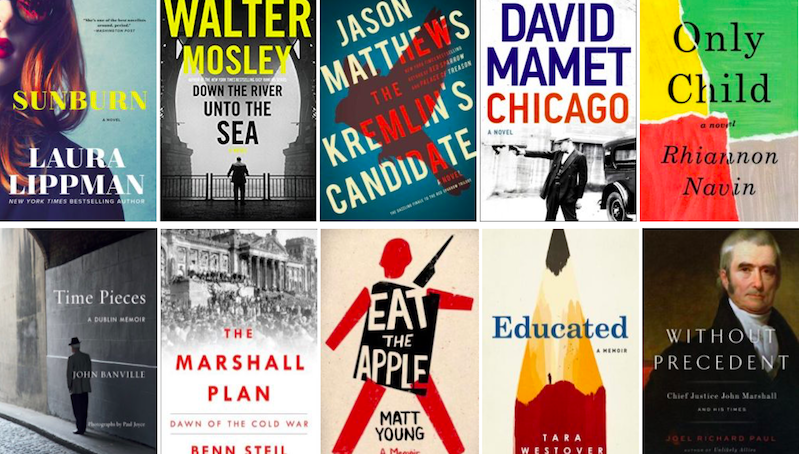
1. Sunburn by Laura Lippman
(6 Rave, 1 Positive)
“It’s an explicit salute to Cain — at one point one of its main characters takes certain inspiration from the classic film versions of Postman and Indemnity — and a more than worthy one … It’s tough to say very much about Sunburn without risking spoilers, and this book deserves not to be spoiled. It’s a virtuoso performance of crafting plot, point of view and voice to reveal some things to the reader while withholding others to create a decadent, delicious tension.”
–Colette Bancroft (The Tampa Bay Times)
2. Chicago by David Mamet
(5 Rave, 1 Positive, 3 Mixed)
“Chicago is as linguistically rich as Glengarry Glen Ross — in fact, as any of his previous work in any medium … In its scope and ambition, Chicago feels like one of the great American male novelists of the late 20th century — Updike, Mailer, Bellow, Roth — trying his hand at writing a genre novel. But unlike those novelists’ somewhat less sure-footed lunges, Mamet lands this with aplomb. This is high genre, a 1920s gangster story, that manages to entertain and engross.”
–Karl Taro Greenfield (The Los Angeles Times)
*
3. Down the River Unto the Sea by Walter Mosley
(3 Rave, 4 Positive, 1 Mixed)
“When reviewing a book by Walter Mosley, it’s hard not to simply quote all the great lines. There are so many of them. You want to share the pleasures of Mosley’s jazz-inflected dialogue and the moody, descriptive passages reminiscent of Raymond Chandler at his best … as gorgeous a novel as anything he’s ever written. And with Joe King Oliver I’m betting, and hoping, he’s given us a character we haven’t seen the last of.”
–Richard Lipez (The Washington Post)
*
4. The Kremlin’s Candidate by Jason Matthews
(4 Rave, 1 Positive)
“Matthews spins a mighty operational web replete with exacting tradecraft and horrific violence. His descriptive precision is breathtaking; the sparring between his vividly realized characters is devilishly clever. With nail-biting suspense, scorching eroticism, dark wit, lashing contempt for politicians dismissive of intelligence work, and fury over Russia’s disinformation campaigns, this is a riveting and knowing dramatization of today’s clandestine geopolitical conflicts.”
–Donna Seaman (Booklist)
*
5. Only Child by Rhiannon Navin
“Only Child earns its worth by avoiding gratuitous scenes of horror in favor of a careful examination of the way one boy and his parents, and their community, struggle to survive — and stay together — after the worst has happened … One of Navin’s strongest techniques is to evoke Zach’s experience with vivid sensory details … paying attention to one child’s well-rendered inner experience of such an event is valuable, and all too sadly important for our world today.”
–Emily Grey Tedrowe (USA Today)
Read an essay by Rhiannon Navin here
**
1. Time Pieces: A Dublin Memoir by John Banville
(5 Rave, 3 Positive)
“If Vladimir Nabokov’s Speak, Memory showed us the memoir as riddle and Martin Amis’s Experience gave us the memoir as history, Mr. Banville has written the memoir as place … The author is first of all a storyteller, and several of the stories in Time Pieces present the many-sided gem of Irish magic … Mr. Banville gives himself something of a premature epitaph: ‘Should have lived more, written less,’ he laments. Fair enough. But what he has written here is beautiful.”
–Michael O’Donnell (The Wall Street Journal)
Read an excerpt from Time Pieces here
*
2. The Marshall Plan by Benn Steil
(5 Rave, 2 Positive, 1 Mixed)
“an important and welcome analysis of why and how the US became a global superpower and the difference it made to the world we inhabit … Steil makes a compelling case that the integration of Western Europe that we now take for granted really began with the Marshall Plan … This is a gripping, complex, and critically important story that is told with clarity and precision. The book is superbly documented and reflects an extraordinary level of research.”
–Terry Hartle (The Christian Science Monitor)
*
3. Educated by Tara Westover
(5 Rave, 3 Positive, 2 Mixed, 1 Pan)
“Despite the gaps between them, Westover is able to see the mix of good and evil, of pride and hurt, in all these people, including herself. Rather than demonize, she wishes to understand. A brilliant mind so long constricted proves elastic and inventive. Whether narrating scenes of fury and violence or evoking rural landscapes or tortured self-analysis, Westover writes with uncommon intelligence and grace. Educated recounts one of the most improbable and fascinating journeys I’ve read in recent years.”
–Dan Cryer (Newsday)
*
4. Eat the Apple by Matt Young
(4 Rave, 2 Positive)
“Matt Young’s inventive, unsparing, irreverent and consistently entertaining Eat the Apple is that, but it is also a useful corrective to the current idealization of the American soldier — or in this case a Marine … Young writes less about war here than about the culture of being a Marine, one of the few and the proud. His memoir — its title, Eat the Apple, refers to a vulgar Marine proverb — is in its own way a loving portrait, but it is also unsparing, ugly and outrageous. I can’t see it making the commandant’s reading list.”
–Mark Bowden (The New York Times Book Review)
*
5. Without Precedent by Joel Richard Paul
(4 Rave, 1 Mixed)
“Highlights of the book include Paul’s illuminating discussions of major court decisions; Marshall’s devotion to his beloved wife, Polly, who was ill for most of their married lives; Marshall’s long-running differences with his cousin Thomas Jefferson; and his friendship with Jefferson’s ally, James Madison. This engrossing account of a key figure in our early history makes for excellent reading.”
–Roger Bishop (BookPage)
***

